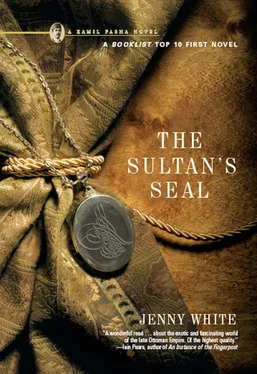Jenny White - The Sultan's seal
Здесь есть возможность читать онлайн «Jenny White - The Sultan's seal» весь текст электронной книги совершенно бесплатно (целиком полную версию без сокращений). В некоторых случаях можно слушать аудио, скачать через торрент в формате fb2 и присутствует краткое содержание. Жанр: Исторический детектив, на английском языке. Описание произведения, (предисловие) а так же отзывы посетителей доступны на портале библиотеки ЛибКат.
- Название:The Sultan's seal
- Автор:
- Жанр:
- Год:неизвестен
- ISBN:нет данных
- Рейтинг книги:5 / 5. Голосов: 1
-
Избранное:Добавить в избранное
- Отзывы:
-
Ваша оценка:
- 100
- 1
- 2
- 3
- 4
- 5
The Sultan's seal: краткое содержание, описание и аннотация
Предлагаем к чтению аннотацию, описание, краткое содержание или предисловие (зависит от того, что написал сам автор книги «The Sultan's seal»). Если вы не нашли необходимую информацию о книге — напишите в комментариях, мы постараемся отыскать её.
The Sultan's seal — читать онлайн бесплатно полную книгу (весь текст) целиком
Ниже представлен текст книги, разбитый по страницам. Система сохранения места последней прочитанной страницы, позволяет с удобством читать онлайн бесплатно книгу «The Sultan's seal», без необходимости каждый раз заново искать на чём Вы остановились. Поставьте закладку, и сможете в любой момент перейти на страницу, на которой закончили чтение.
Интервал:
Закладка:
“Look to your own heart for knowledge of the divine,” my dayi instructed me, “not the interpretations of scribes and clerics. Nature is a sage; hear it with your heart. Be humble in your knowledge, but glorify Allah with what you have learned. Sheykh Galib was educated at home, like you, and was composing poetry when he was little older than you are now. Nothing in life is aimless or out of place. All is inspired.”
Ismail Dayi urged Mama to join us, but she preferred to stay in her rooms, wrapped in the ermine robe Papa had given her the first winter of their marriage. She had developed a taste for reading French novels and, although he disapproved of what he said was the frivolity and dangerous foreign pollution of novels in general (and French novels in particular), Ismail Dayi kept Mama supplied with them from the booksellers in the city. A steady stream of apprentices brought him parcels of new books. Indeed, I saw scattered about the library a great number of books and journals in French and other languages I did not recognize. Those I could read tended to be difficult treatises that I attempted but soon laid back on the shelf.
Some evenings, I did not find Ismail Dayi, though I had heard the carriage arrive and the groom Jemal sing a soulful folk song as he walked the horses past the kitchen door toward the orchard. Jemal was slender and boyish, but very strong. Unlike most men, he did not have a mustache, although he wore a felt cap and the long, baggy shalwar pants of country men. He loved pomegranates. When they were in season, he would keep one of the leathery red orbs in his hand for hours, carrying it about with him and kneading it with his fingers. One late summer day, I was watching the silver-bristled kangal dogs that slouched around his yard. I was afraid of these large dogs, so I crouched behind the jacaranda bush. Jemal was sitting on a chair just outside his blue-painted front door, sleeves rolled above his elbows, concentrating his full attention on the pomegranate he was rotating rhythmically in the palm of his right hand. His back was tense and the muscle in his arm rippled. Suddenly he stopped and, raising the fruit to his nose, sniffed it, then stroked it gently across his cheek. He put the red skin to his mouth and slowly nipped it with his teeth. Examining the opening he had made, he raised the pomegranate to his mouth and sucked at the opening until all that remained was a leathery sack. Afterwards he sat, staring into space, his face flushed, his lips slightly pursed. Ruby drops glistened on his chin. The husk lay on the grass at his feet.
Late one night in the lonely period after Madam Élise’s departure, I was roaming the house and was startled to see Jemal moving stealthily in leather house socks through the dark kitchen toward the rear door, his outdoor overshoes and turban in his hands. His black hair was long as a girl’s. His face had the same expression as when he had finished with the pomegranate.
8
Light floods through the open doors onto the lawn of the British Residence. Orange paper lampions have been strung along the paths. Servants circulate with trays of savories and fruit and bottles of chilled French wine. Kamil is here in search of someone who knew Mary Dixon. He finds this the most difficult part of his work, interacting socially with strangers. As a young man during his father’s reign as governor, he had endured long hours of empty pleasantries at endless functions, each word inflicting a dull pain until he had to pull away. From a vantage point in the garden or a quiet room, he would watch as figures met and merged, then withdrew and rejoined others in a complicated board game. He could see patterns in these interactions: the wealthy, the powerful, and the beautiful, and those who vied to be in their presence; respect shown or withheld; the sheep cut from the fold by a predator; the individual of wit or erudition and an admiring but unstable crowd of consumers; too obviously averted glances; the interplay of men and women when the rules of engagement were unclear. It was endlessly fascinating. He still prefers to watch, unless he finds an engaging partner for conversation. Good conversation is becoming rarer, he muses, since the sultan increased the number of his spies and people no longer dare venture opinions on even the most mundane subjects in their own drawing rooms.
Stepping indoors, he sees the ambassador stoop to listen to a dignified man in a uniform with red piping and gold epaulets. Women in low-cut evening dresses stand in groups like bouquets of gaudy, overblown roses. None are veiled. It startles Kamil to see such expanses of gleaming hair and pale skin exposed to view. The orchestra plays a waltz. Women lean backward into men’s arms, their opposing forces channeled into a vortex of movement. The women’s wide skirts swing like bells, their jewels blaze in the lamplight. Men in dark suits and uniforms, their shadows. Kamil thinks of bright autumn leaves captured by the current.
He wanders back into the garden. Sybil came to him briefly after his arrival, a swirl of skirts and color, to take his hand and welcome him before she was swept away by newer guests. The pressure of her hand remains in his.
A middle-aged man with irregular features and carrot-colored hair corners him against the patio railing.
“So, you’re the pasha. Sybil said she had managed to browbeat you into coming to this shindig. It’s a rough game, ain’t it?” he says, shaking his head and sweeping a hand toward the buzzing crowd. “Nobody wants to talk about the really interesting stuff anymore.” He squints his small blue eyes at Kamil. “Glad you could make it, though. I’ve been looking forward to meeting you. I’m Sybil’s cousin, Bernie Wilcott. From the U. S. of A., as I’m sure you’ve guessed.” His breath smells of mint. Serious eyes trapped in a taffy-pull face.
“Kamil. A pleasure to meet you.” Kamil extends his hand.
Bernie grasps it and pumps it, once. “Forgot. Sybil told me you learned your English in the Old Country.”
“Cambridge University. I studied there for a year. Before that, I learned English here, with tutors. How is it that Sybil Hanoum has an American cousin?”
“Sybil Hanoum? Has a nice ring to it.” Bernie chuckles. “Well, her uncle, that’s my father, was the younger brother. You know what that means. Eldest takes all, the whole farm. Or, in this case, the manor house. So he did what younger brothers have done since time immemorial, left the kingdom to seek his fortune. Found it in railroads, but his kids inherited a gawd-awful accent.” He bends over, chortling at his own wit.
Kamil can’t help but laugh along with him.
“You are visiting Istanbul?”
“Well, actually, I’m here for the year. Teaching at Robert College.”
“Ah, you’re a teacher.” Kamil thinks this unlikely, given the man’s eccentric nature, but he hasn’t met many Americans.
“Bernie Wilcott, itinerant scholar.” Bernie bows low and touches his hand to his brow and chest in a mock Ottoman greeting.
Kamil, disbelieving, asks, “What is your area of study?”
“Politics. East Asia, China, but I have a weakness for the Ottomans, and am mighty curious to know more.” He takes Kamil’s arm and steers him into the garden. “Maybe you could be my guide.”
It doesn’t take long for Kamil to feel at ease with Bernie and to recognize that what he had perceived as buffoonery was simply a lack of the formality that usually encases people like lacquer. Moving in society, people rub and clack their carapaces against one another like mating beetles. In contrast, Bernie seems immediately available. They sit on a bench, facing away from the crowd and chatting. Kamil is relieved and pleased to find an intelligent observer of the world. The embers of their cigarettes pulse alternately in the dark.
Читать дальшеИнтервал:
Закладка:
Похожие книги на «The Sultan's seal»
Представляем Вашему вниманию похожие книги на «The Sultan's seal» списком для выбора. Мы отобрали схожую по названию и смыслу литературу в надежде предоставить читателям больше вариантов отыскать новые, интересные, ещё непрочитанные произведения.
Обсуждение, отзывы о книге «The Sultan's seal» и просто собственные мнения читателей. Оставьте ваши комментарии, напишите, что Вы думаете о произведении, его смысле или главных героях. Укажите что конкретно понравилось, а что нет, и почему Вы так считаете.












